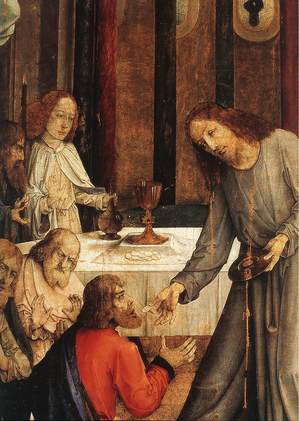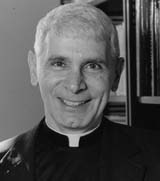William Butler Yeat's "The Second Coming" contains what are, perhaps, the most-quoted lines of twentieth century poetry. "Things fall apart; the centre cannot hold; Mere anarchy is loosed upon the world." Written in 1920, the poem not only summed up the horror of the still young century, it seemed prescient of horrors yet to come.
Postmodernity may be, to some degree, a pretentious academic fad. But its soil is undoubtedly the collapse of an authoritative, life-giving center and the ensuing fragmentation experienced daily in culture, politics, and individual lives.
One result is the emergence of the "protean self," imaginatively portrayed in Woody Allen's film "Zelig." Here is the self without a center, blending effortlessly into the most disparate situations and bound by no ultimate and lasting commitments -- but also quite capable of murderous rage.
Brooding over the twenty-first century is no longer the specter of Marx, but that of Nietzsche. The "death of God" leads to an abyss of nothingness. While many strive to fill the emptiness with the ever-changing trinkets of consumerism or the endless titillations of the media, a few do so by indulging an unfettered will to power. And absence, not presence, seems to reign.
Faced with this cultural situation (one that Pope John Paul II called a "culture of death"), where is the Christian believer to find, in the words of another poet, T.S. Eliot, "the still point of the turning world"? Ultimately in the Eucharist, the flaming center of the world, the sacrament of real Presence.
At the central point of the celebration of the Eucharist, the priest announces to the congregation: "the mystery of faith." And the congregation exclaims: "We proclaim your death, O Lord, and profess your Resurrection until you come again." In doing so we trace the temporal coordinates of the new world of faith.

"We proclaim your death." The Eucharist celebrates, remembers, re-presents the once and for all sacrifice of Christ on Calvary. Christ descended into the abyss of death, the void of absence. He attained new and everlasting life not despite death, but by transforming death. Thus Christ's followers are schooled, in the Eucharist, not to deny death in its many forms, such as disappointment, hardship, failure; but, in company with Christ, to transform the power of death.
For "we profess your Resurrection." The Christ present in the Eucharist is the living Jesus and the disciples live through him and with him and in him. He is not a dim figure of the past to be studied at a distance, but the living one encountered in the today of faith. He declares: "I am the first and the last, the living One. I died, and behold I am alive for evermore, and I hold the keys of death's dominion" (Revelation 1:17&18). In the Eucharist we do not learn about Christ, but from him.
Still his presence remains hidden under sacramental signs. It is a real Presence that is not yet fully manifest. And so faith confesses: "Christ will come again" to sum up all things in himself, to "judge the living and the dead." Only then will he complete the work of creation and redemption; and "God will be all in all" (1 Corinthians 15:28).
The Eucharist opens to faith a new world of persons in rela tion whose form and substance is the person of Jesus Christ. And it also calls forth the new personhood of the participants, their gradual transformation into living members of Christ's body. "Here there cannot be Greek and Jew, circumcised and uncircumcised, barbarian, Scythian, slave, free, but Christ is all and in all" (Colossians 3:11).
The whole thrust of the Eucharist is to nurture a movement from fragmentation to integration: the broken bread becomes the salvific means for the gathering in of the many, the blood outpoured achieves the at-one-ment of the world. What is de-centered finds its center in Eucharist. Those who despair of meaning can find here God's meaning and purpose.
The Eucharist, then, is pure gift, grace. God so loves the world that he gives his only Son. And the Son so loves us that he continues to give himself for the world's salvation, nowhere more tangibly than in the Eucharist.
But the Eucharist is also imperative, task. It calls believers to allow the presence of Christ to transform both themselves and their world. In place of the protean, rootless self of postmodernity, the Eucharist fosters a centered self, free to give generously as he or she has so generously received.
What better name for this self emerging from the encounter with Christ in the Eucharist than a "eucharistic self," one whose native language is thanksgiving? For as Paul writes to the Colossians: "whatever you do, in word or deed, do everything in the name of the Lord Jesus, giving thanks to God the Father through him" (3:17).
The deeds that flow from such a eucharistic self are deeds of service, in solidarity with the most needy members of Christ's body. The participants in the Eucharist are sent forth to undertake works of justice and peace that help provide the human conditions for genuine thanksgiving. The eminently practical Epistle of James warns: "If a brother or sister is ill-clad and in lack of daily food, and one of you says to them, 'Go in peace, be warmed and filled,' without giving them the things needed for the body, what does it profit?" (2:15&16). The Eucharist both nourishes a eucharistic self and promotes a eucharistic ethic.
As is well known, the account of the Last Supper in the Gospel of John does not contain a narrative of the institution of the Eucharist, as the other gospels do. In its place we find, instead, Jesus washing the feet of his disciples and instructing them: "I have given you an example: as I have done to you, you also must do" (13:15). Therefore the injunction of Christ, "do this in memory of me," repeated at every celebration of the Eucharist, embraces both the breaking of the bread and the ongoing service of others. Both these eucharistic actions are performed for the life of the world, for the fuller realization of Christ's Presence in all.
Robert ImbelliMay 1, 2011
L'Osservatore Romano online edition

Robert Imbelli is a priest of the Archdiocese of New York who studied in Rome during the time of Vatican II. Imbelli earned a doctorate in systematic theology from Yale University. Having taught at several institutions of higher learning, he's an associate professor of theology at Boston College. He periodically writes for L'Osservatore Romano.


Leave a comment